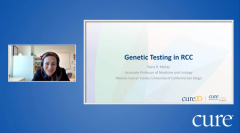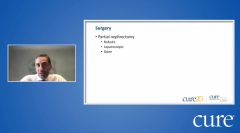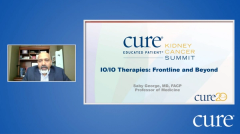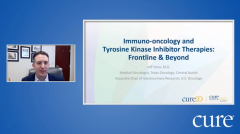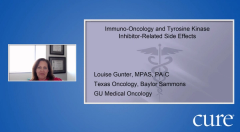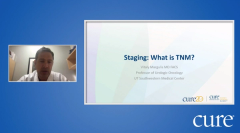
Educated Patient® Kidney Cancer Summit Adjuvant Therapy Options Presentation: April 9, 2022
Watch Dr. Naomi Haas, from Abramson Cancer Center, discuss adjuvant therapy options, during the CURE Educated Patient Kidney Cancer Summit.
Episodes in this series

Adjuvant therapy, or the administration of additional cancer treatment following a patient’s initial treatment — which often includes the surgical removal of the tumor and/or affected organ — is not something that every patient with kidney cancer should receive, according to an expert.
Dr. Naomi B. Haas, director of the Prostate and Kidney Cancer Program at Abramson Cancer Center in Philadelphia, discussed the Food and Drug Administration (FDA)-approved adjuvant therapy options for kidney cancer and which patients are most likely to benefit from treatment with these regimens during CURE®’s Educated Patient® Kidney Cancer Summit, held on April 9, 2022.
The Dilemma Surrounding Adjuvant Therapy
Adjuvant therapy, Haas explained, is often given to patients when providers are under the impression that the patient may be at high risk for a disease recurrence, even after the tumor and/or affected kidney have been surgically removed.
“Ideally, we want (adjuvant therapy) to cure more patients,” she said during the presentation. “(But) we don't want to just be giving treatment to everybody, because not all of you will need treatment.”
The reason being, Haas continued, is that not all patients are at high risk for their disease returning.
To determine the best treatment approach for their patients, providers use a staging system known as TNM.
For instance, Haas noted that a patient could present with disease that has invaded either the veins of their kidney or the part of their kidney where the urine travels into their bladder. Or, a patient may have had their cancer, which was completely removed, spread to a distant part of their body. She stressed that if that metastasis was removed several years ago and the disease eventually spread again, a provider may likely “cut it out again” and follow-up with the patient every so often to ensure the disease didn’t recur.
But, in the chance the disease recurred or spread not long after the surgery, then, Haas mentioned, the patient would be considered high risk.
The problem is that there’s no exact rule for who qualifies for adjuvant therapy.
“I want to emphasize that there's a lot of patients in any of these categories that can have surgery, and we can just watch (them), and it may never come back,” she said. “That’s one of the big things that's hard in deciding who should get adjuvant therapy.”
Interest in Using Metastatic Disease Treatments Earlier
There has been a plethora of treatments — including, but not limited to, Sutent (sunitinib) and Nexavar (sorafenib) — that have been shown to be efficacious in treating metastatic kidney cancer. As a result, according to Haas, providers wanted to test these therapies in other settings, including as an adjuvant treatment option.
However, after years of follow-up data, many of the VEGF inhibitors that were effective in the metastatic setting showed very little activity as an adjuvant therapy.
Moreover, researchers assessed these particular therapies in patients with metastatic disease that was completely resected. In two trials — one in Italy and the other in the United States — adjuvant treatment with these inhibitors was not superior to placebo or observation. In fact, Haas noted, a further hinderance of using these drugs is the presence of serious or severe side effects.
Some of the side effects associated with VEGF inhibitor use, according to Haas, include high blood pressure, the peeling of skin on a patient’s hands, as well as diarrhea and fatigue.
“Patients who've had their kidney removed are not really excited about getting these drugs, because they don't really want to feel bad after they've had their surgery, especially if they haven't had any disease present,” she said.
Immune checkpoint inhibitors
An interesting development, Haas mentioned, has been the emergence of immune checkpoint inhibitors (ICIs). Mostly delivered intravenously, ICIs don’t directly attack the cancer. Instead, she explained, they enable a patient’s immune system to fight the cancer.
“That’s really a good strategy and a lot of people feel really well on these drugs,” she said.
Although she referenced multiple trials in progress evaluating the efficacy and safety of several ICIs, she focused on the results of the KEYNOTE-564 trial, since most of the other data are not yet available.
In KEYNOTE-564, investigators assessed if Keytruda (pembrolizumab) was more effective in patients following surgery than placebo. The data, which were presented during a medical conference last year, demonstrated that treatment with Keytruda
Based on the findings, the
The results also indicated that treatment with Keytruda in this population was considered safe since only 20% of patients experienced severe side effects.
“But I do want to warn you with these immune checkpoint inhibitors; a lot of us in the community are concerned because if you get a side effect from an immune checkpoint inhibitor, it can be fairly significant,” she said.
For instance, Haas noted, ICIs can attack a patient’s pancreas and ultimately lead to diabetes. Additionally, patients can develop arthritis as well as inflammation of the lungs or colon.
“Generally, the stuff in the lungs and the colon are things that we can correct with steroids, and they can get better, but some of these other things like arthritis and diabetes can be more permanent,” she said.
There is still, however, some unanswered questions as to the use of adjuvant therapy, according to Haas.
“How long should we treat people? Is a year enough or too much, should we give two drugs or one drug? Are we overtreating some people … or are we undertreating some patients,” she said.
Who should get adjuvant therapy?
“Some of you don't need adjuvant therapy,” she said. “But … in the people that could get adjuvant therapy, my recommendations are, it's really a collective decision between your urologist, your medical oncologist and yourself. And, if you have very high-risk disease, these are the people that we know, probably benefit the most. And as we get farther out, and we do kind of real-world data with normal patients not specific to clinical trials; people that have other health issues I think we'll learn a lot more about these drugs.”
For more news on cancer updates, research and education, don’t forget to

